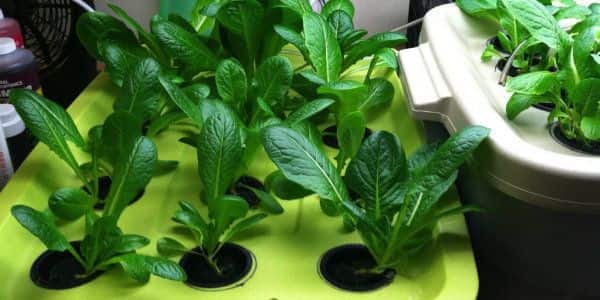Students at Arturo A. Schomburg Satellite Academy High School are harnessing the power of hydroponics to expand their garden program.
The seed for the idea was planted when a rooftop hydroponic farm appeared on a neighboring Bronx apartment building. In this dense, urban area, outdoor space is limited and rooftop gardens are becoming a popular way to add more green spaces.
Carol Kennedy, Schomburg High’s science teacher and garden coordinator, was inspired by the neighbor and began to explore hydroponics as a way to expand the school’s program, which already included a small outdoor community garden.
Funded by a Whole Kids Foundation School Garden Grant, Carol and a team of students designed and built a mini indoor hydroponic system in an available classroom.
They relied on advice from two local hydroponics stores and instructional YouTube videos to customize their setup, which consists of a basic grow light positioned above a network of plastic tubing that connects a series of inexpensive plastic storage tubs and buckets with holes cut in the lids.
“Most of what I learned came from visiting the local hydroponic stores, and that’s the first thing I would recommend to anyone interested in this type of project,” Carol says. “They actually offered us classes and helped me make connections to the larger hydroponic companies to get supplies. They provided hydroponic textbooks and activities for the classroom, which I modified for my classes. And also they helped us brainstorm and troubleshoot our do-it-yourself system.”
Students have been using the system to grow vegetables since 2012, and it will serve as a prototype for Schomberg High’s long-term vision: a much larger rooftop hydroponic farm that would provide a shared resource for more than 1,000 students (Arturo A. Schomburg Satellite Academy shares the building with two other high schools, a GED program and a child care center) and serve as a model for the surrounding community.
Even a small-scale hydroponic garden provides big opportunities for lessons in math, science and engineering, and about the environmental impact of different types of agriculture. Although soil-grown crops certainly have their own advantages, benefits of hydroponics include:
- less water use
- less land needed because plants can be stacked or arranged in other non-traditional ways
- reliance on herbicides or pesticides is reduced or eliminated
- ability to grow certain crops even during extreme temperatures
- it offers a way to grow food in areas with poor soil quality
Because hydroponic gardens are environmentally controlled, they are less dependent on climate, which means they can expand the possibilities for schools in almost any location.
For more information about starting a hydroponic garden, visit the kidsgardening.org Exploring Classroom Hydroponics section.



